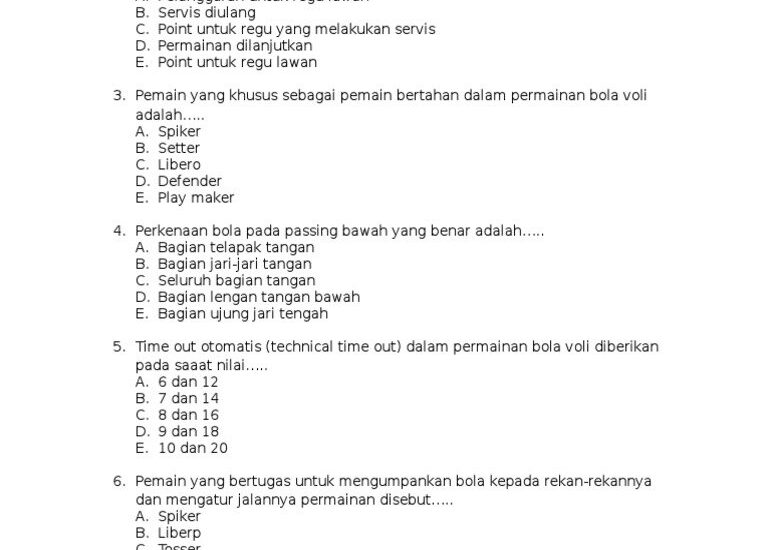In volleyball, the player specifically designated for defensive duties is the libero. This specialized role focuses on receiving serves and digging up attacks, making the libero crucial for a team’s defensive strategy. Often wearing a different color jersey, the libero has unique rules that enhance their performance on the court.
Pemain yang khusus sebagai pemain bertahan dalam permainan bola voli adalah liberos, who bring agility, quick thinking, and exceptional reflexes to the game. Their ability to read the opponent’s plays and react instantly sets them apart, making them invaluable in high-stakes matches.
pemain yang khusus sebagai pemain bertahan dalam permainan bola voli adalah
In volleyball, defending is a crucial component of the game. The position that focuses primarily on defense is known as the libero. Libero players are specialized defenders who play an essential role in both indoor and beach volleyball. This article will explore the role of the libero in-depth, discussing their responsibilities, skills, and how they impact the game.
Understanding the Role of the Libero
The libero is a unique position in volleyball, introduced to create a more defensive style of play. Unlike other players, the libero wears a different colored jersey and cannot attack the ball above the net’s height. This makes them a critical asset in the defense lineup, as they focus on receiving serves and digging spikes from the opposing team.
Key Responsibilities of the Libero
The libero has several key responsibilities that make them integral to the team’s defense. Here are the primary duties:
- Serve Reception: The libero specializes in receiving serves and is often the first line of defense against an opponent’s serve.
- Defense: They play a significant role in digging balls that come over the net, attempting to prevent the opposing team from scoring.
- Ball Control: The libero is responsible for keeping the ball in play and making accurate passes to setters to set up attacks.
- Substitution: Liberos can substitute in and out of the match freely, allowing for fresh defensive energy when necessary.
- Communication: They often lead communication on the court, helping to organize the defense and inform teammates about their positions.
Skills Required for a Libero
To excel as a libero, players must develop a specific set of skills. Here are some essential skills that every libero should possess:
Defensive Skills
A libero needs to have quick reflexes and an understanding of where the ball is headed. This includes:
- Diving: The ability to dive and get low saves balls that are difficult to reach.
- Positioning: Knowing where to position themselves on the court to intercept the ball effectively.
- Reading the Game: Anticipating the opponent’s moves and adjusting their position accordingly.
Passing Skills
Passing is one of the most critical skills for a libero since they often facilitate the attack after receiving the ball. This includes:
- Overhead Passing: Being able to make accurate overhead passes to the setters.
- Forearm Passing: Mastering forearm passes for low balls to create better ball control.
Communication Skills
Effective communication helps ensure that everyone on the team is on the same page. A libero should be able to:
- Call for the Ball: Make their presence known when they are about to receive the ball.
- Organize Defense: Communicate strategies and positions during a play.
The Impact of a Libero on the Team
Having a strong libero can significantly impact a volleyball team’s performance. The right libero not only contributes defensively but also uplifts the entire team’s morale and performance. Here are a few ways a libero can influence the game:
Improved Defense
A good libero enhances the team’s overall defense, making it harder for opponents to score. They are the backbone of the defense, allowing for seamless transitions from defense to offense.
Boosting Team Confidence
When a libero performs well, it boosts the entire team’s confidence. Knowing that there’s a dedicated defender on the court can allow players to take more risks in their gameplay.
Facilitating Offense
By providing accurate passes to setters, a libero helps create scoring opportunities. This transition from defense to offense is critical, as successful plays often depend on quick ball control.
Choosing the Right Libero for Your Team
Selecting the right libero is essential for a team’s success. Coaches should consider various factors when looking for this specialized player. Here are some tips for choosing an effective libero:
Evaluating Skills
Coaches should observe potential liberos in practice and games, focusing on:
- Defensive skills and speed.
- Passing accuracy and control.
- Communication abilities.
Personality Fit
A libero’s personality can greatly affect the team’s dynamic. Coaches should look for players who are:
- Energetic and positive, helping to lift the team spirit.
- Confident, ensuring steady performance under pressure.
- Vocal, making sure they can lead their teammates effectively.
Training Tips for Aspiring Liberos
Becoming a successful libero requires dedicated training and practice. Here are some training tips for those aspiring to excel in this position:
Drills for Improving Skills
Aspiring liberos should engage in drills that focus on enhancing their defensive and passing abilities. Here are some effective drills to practice:
- Shuttle Runs: Improve agility and speed.
- Passing Drills: Work on forearm and overhead passing with different ball speeds.
- Dive Drills: Practice diving to increase overall defensive skills.
Conditioning and Fitness
Stamina plays a crucial role in a libero’s effectiveness. Incorporate fitness training that focuses on:
- Cardiovascular endurance to maintain energy throughout the match.
- Strength training to enhance overall power and prevent injuries.
- Flexibility exercises to improve range of motion and agility.
Study the Game
Understanding the game is vital for a libero. Players should:
- Watch professional volleyball matches to learn different defending strategies.
- Analyze their gameplay to identify areas for improvement.
- Engage with teammates for feedback on their performance.
The libero plays an indispensable role in volleyball, specializing in defense while also having a significant impact on the overall game strategy. By focusing on their responsibilities, honing specific skills, and contributing to team dynamics, a libero can elevate a team’s performance. Whether you’re a coach selecting a libero or a player aspiring to fill this vital position, understanding the role, responsibilities, and skills necessary to excel will greatly enhance your volleyball experience.
Tugas Libero Dalam Permainan Bola Voli
Frequently Asked Questions
What are the primary responsibilities of a defensive player in volleyball?
A defensive player in volleyball primarily focuses on preventing the opposing team from scoring points. Their key responsibilities include digging, which involves receiving powerful attacks from opponents, and passing the ball accurately to facilitate effective plays. They also aim to read the game, anticipate the opponent’s moves, and position themselves optimally to intercept the ball.
How does a defensive player differ from other positions in volleyball?
A defensive player specializes in defensive strategies, emphasizing skills like digging and receiving serves. Unlike offensive players who focus on attacking and scoring, defensive players prioritize keeping the ball in play and supporting their teammates through solid, strategic positioning. Their role is crucial for maintaining rallies and creating opportunities for offensive plays.
What skills are essential for a successful defensive player in volleyball?
Successful defensive players need strong ball-handling skills, quick reflexes, and excellent spatial awareness. They must possess the ability to read the game effectively, react swiftly to incoming balls, and maintain a low center of gravity to enhance their stability. Additionally, effective communication with teammates plays a vital role in coordinating defensive efforts.
Can a defensive player also contribute to the offense in volleyball?
Yes, defensive players can contribute to the offense. After successfully receiving or digging a ball, they often play a crucial role in setting up counterattacks. Their accurate passes to setters can initiate offensive plays, allowing their team to transition from defense to offense effectively.
Are there specific training techniques for improving defensive skills in volleyball?
Training for defensive skills often involves drills that focus on reaction time, agility, and footwork. Coaches may use specific exercises such as shadowing movements, practicing digs against various types of attacks, and engaging in partner drills that simulate game situations. Regular practice will help players improve their anticipation and decision-making on the court.
Final Thoughts
Pemain yang khusus sebagai pemain bertahan dalam permainan bola voli adalah posisi yang sangat penting dalam tim. Mereka bertugas untuk menerima servis lawan dan menghalau serangan dengan akurasi. Kemampuan bertahan yang baik membantu tim menjaga poin dan membangun serangan yang lebih solid.
Dalam permainan ini, pemain bertahan harus memiliki reaksi cepat dan keterampilan teknik yang tinggi. Keberadaan mereka memungkinkan tim untuk merespons setiap situasi dengan lebih efektif. Keterampilan ini menjadikan pemain bertahan sebagai panutan dalam strategi pertahanan tim.






